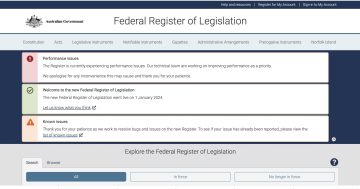
From 1 January Canberrans will be able to access much more Government information without the need to lodge FOI requests.
It’s been a long time coming but as of 1 January 2018, we have been able to understand the workings of the ACT Government much better, with some of the country’s most comprehensive Freedom of Information (FOI) laws coming into effect from the beginning of the new year.
These new laws have been designed to create a more open government and mean that government information will be much more available and accessible. They aim to create an expectation that the public has a right to government information and access to this information is essential for an effective democracy.
From now on, the Government must proactively publish expert reports, policy documents, and information such as agency activities and budgeting. Government information that has to date been wrapped in secrecy – information such as incoming minister briefs, question time briefs, estimates and annual reports briefs, will be required to be published after five years. Ministers’ diaries must also be published to provide transparency around who is meeting who, and which organisations and bodies are trying to persuade elected officials of the merits of their particular ideas and proposals. This is called the ‘push model’ for the provision of information and means that information that previously would have been required to go through an FOI process to become public will now be available as a matter of course, unless it is contrary to the public interest to do so.
Whether it be proactively available information, or information that is the subject of a specific FOI request, the new laws establish a new framework for determining the public interest in the disclosure or non-disclosure of government information. This is weighted much more heavily towards releasing information to the public as information can only remain confidential where it is necessary to protect essential public interests (including the right to privacy), or when the information is held by certain statutory office holders who must decide the release of information under a different statutory scheme and where the information they have obtained from another government agency may be able to be accessed through that agency directly.
There is also a greater role for the ACT Ombudsman around the review of decisions and complaints – meaning that Government agencies’ rejection of requests on the grounds of public interest will be scrutinised by a third party. Further review processes are also available through the ACT Civil and Administrative Tribunal.
These laws have been the subject of much discussion and wrangling. Proposals were flagged in the previous 2012 Parliamentary Agreement but were not passed until 2016. When the proposed legislation was introduced in August 2016 by ACT Green’s MLA Shane Rattenbury, there was significant discussion and many amendments were introduced during this debate. As a result, some proposals such as including Cabinet documents in the regime, and reducing the time limit for the release of sensitive documents from five years to three years was seen as a bridge too far for the major parties.
While some compromise was needed to get the laws passed, these are a real step forward in transparency and accountability around government decision making. These laws are important in increasing public confidence in government decision making and will complement other reforms such as the establishment of new bodies such as such as the Independent Integrity Commission.
I think these new laws are a big step forward in increasing the transparency and accountability of governments, will improve government decision making and will make our democracy stronger. What do you think?
Rebecca is an active member of the ACT Greens and was a candidate in the 2016 Territory election.





















